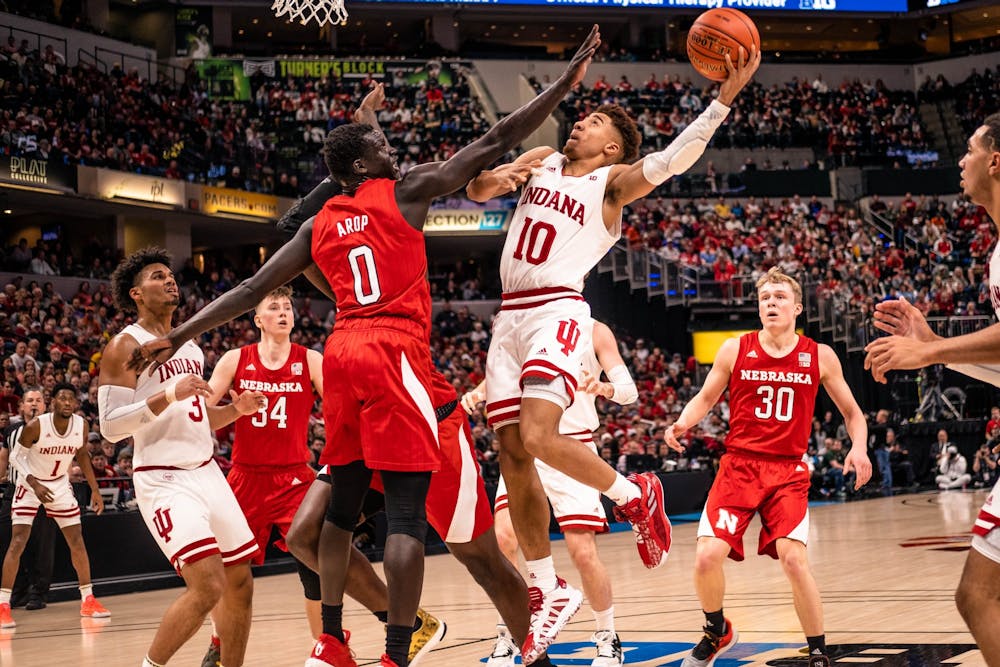INDIANAPOLIS — The line to use the sink inside the men’s room at Bankers Life Fieldhouse was longer than the one to use the bathroom. Bottles of hand sanitizer lined up on tables throughout the concourse, and fans stopped to pump a handful before continuing to their seats.
Fans seemed to understand the severity of the coronavirus — which has infected at least 1 2 people in Indiana — but the Big Ten did not.
While many conferences over the past few days announced fans would not be allowed to attend games during their respective tournaments, including the Ivy League canceling all spring athletics practices and competitions through the end of the semester, the Big Ten foolishly stated nothing was going to change.
“When world experts start to recommend things, you obviously better listen,” IU head coach Archie Miller said.
The Big Ten resisted.
It wasn’t until the NCAA practically strong-armed the Big Ten by announcing both the men’s and women’s basketball tournaments wouldn’t be played in front of a crowd that they finally relented.
Just before tipoff the tournament's first game Wednesday, the Big Ten announced games would be closed to the public starting Thursday for the second round of the tournament. The problem was that the Big Ten had waited too long, and the damage had already been done.
We are in the midst of a global crisis, and the Big Ten tried to maximize its revenue.
Fans had arrived at Bankers Life Fieldhouse for the first game of the afternoon between Northwestern and Minnesota while a bigger crowd got ready to see IU play the night-cap against Nebraska.
Early in the second half, news broke that the NBA had suspended its season after Utah Jazz forward Rudy Gobert tested positive for the coronavirus. An uneasiness filled the arena as the alert started popping up on fans' phones and concern continued to grow.
“It was like telling them a family member was sick,” Miller said. “I think the NBA probably just put the sporting world on hold.”
Everything came to a head at the under-four minute timeout when Nebraska’s head coach Fred Hoiberg left the bench after falling ill.
Following the game, the Big Ten announced that Nebraska wouldn’t be doing a press conference. It was later reported Hoiberg had been hospitalized, and the team was being quarantined in its locker room.
Nobody should have been allowed in the stadium besides essential personnel, but dollar signs pulled harder than common sense. The Big Ten thought it could somehow avoid a disease that was declared a pandemic and put everyone in danger.
Shut the doors, and keep out the crowds. It's a simple concept that the Big Ten couldn’t seem to grasp in time, and now everyone is paying the price.
“I think, once you start getting the news that we got after the game, I think right now for our players, it's let's get cleaned up, let's get out of here,” Miller said. “Let's get back to the hotel where we can keep our group kind of tight and move forward with tomorrow.”
Since the game on Wednesday night, the Big Ten took another step in its attempt to redeem itself by cancelling the remainder of the tournament.
Even with the reality that the NCAA Tournament will likely be cancelled — or at the very least suspended — the worst possible outcome is student athletes becoming sick. If there is going to be any hope that we get to experience a version of March Madness, the players must be healthy.
Even without crowds, camera crews, media and support staff have all been around strangers in crowded arenas over the past several weeks. We are the danger to the players, not each other.
Yes, you can argue that the games should be played as if it were a closed scrimmage, but the reality is that college basketball is an entertainment sport, and the NCAA isn’t going to assume any risk if there is no money.
For the first time during this crisis, the Big Ten did the right thing. Give the game a breather and pray it will resume shortly. Many sports fans thought it wasn't possible, but some things are bigger than March Madness.




